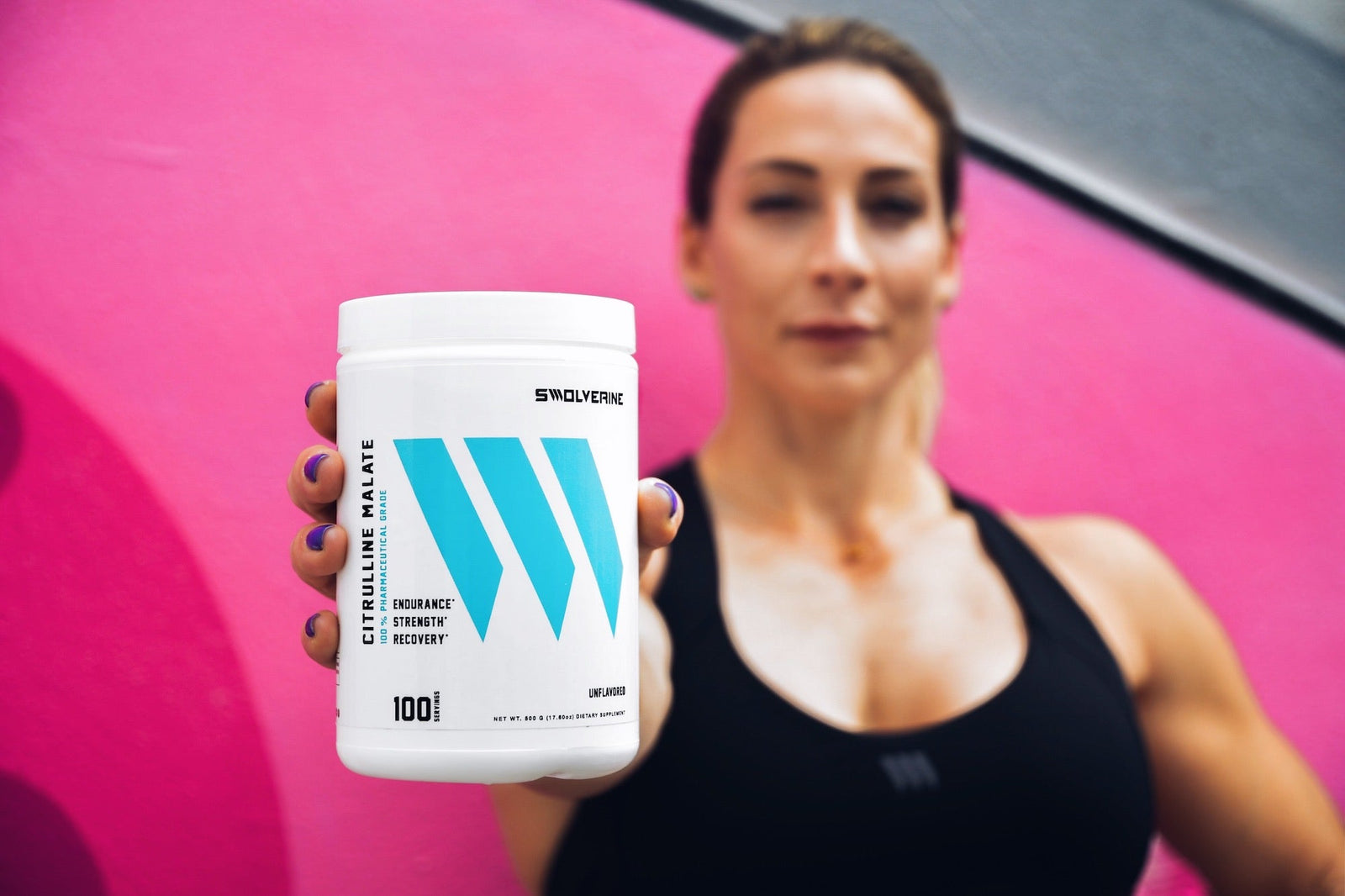When it comes to pushing your limits in the gym or on the field, every rep, every second, and every breath counts. That’s where Citrulline Malate comes in — a clinically proven, dual-action compound that doesn’t just promise better performance; it delivers. Backed by years of research and used by elite athletes and weekend warriors alike, Citrulline Malate is the gold standard for increasing endurance, power output, blood flow, and recovery.
Unlike trendy supplements that rely on hype, Citrulline Malate works at the cellular level to optimize energy production, reduce fatigue, and supercharge nitric oxide levels — giving you skin-splitting pumps, more reps, and faster recovery between workouts. If you’re serious about results, it’s time to understand why Citrulline Malate isn’t just a supplement — it’s a performance advantage.
Citrulline Malate: The Science-Backed Pre-Workout Powerhouse
What Is Citrulline Malate?
Citrulline Malate is a compound made by combining L-citrulline, a nonessential amino acid, with malate, a natural salt of malic acid found in tart fruits like apples. This pairing enhances both nitric oxide production and energy metabolism, making it a staple ingredient in pre-workout supplements.
L-citrulline increases nitric oxide (NO) levels by converting to L-arginine in the kidneys, then stimulating NO synthesis — a gas that dilates blood vessels, improves blood flow, and enhances nutrient delivery to muscle tissue. Malate, on the other hand, plays a central role in the tricarboxylic acid (TCA) cycle, aiding ATP production and supporting muscular endurance and fatigue resistance.
How Citrulline Malate Works
L-Citrulline Increases Nitric Oxide Production
L-citrulline indirectly elevates nitric oxide, a molecule responsible for relaxing and widening blood vessels (vasodilation). This increased blood flow enhances muscle pumps, vascularity, and oxygen delivery during exercise. Unlike L-arginine, which is broken down in the gut and liver, L-citrulline bypasses first-pass metabolism, making it more bioavailable and effective (Moinard, The Journal of Nutrition, 2015).
Malate Enhances ATP Energy Production
Malate acts as an intermediate in the Krebs (TCA) cycle, helping the body produce aerobic energy more efficiently. This helps delay muscle fatigue and increases endurance during high-intensity workouts. Studies suggest that malate is the driving force behind the added performance benefits of Citrulline Malate versus L-citrulline alone (Bendahan, British Journal of Sports Medicine, 2002).
Proven Performance Benefits of Citrulline Malate
1. Increased Strength and Power Output
Citrulline Malate improves phosphocreatine recovery and increases total volume lifted during resistance training. In a controlled study, lifters supplementing with 8g of Citrulline Malate completed more reps and experienced significantly less post-exercise soreness (Pérez-Guisado & Jakeman, Journal of Strength and Conditioning Research, 2010).
2. Better Muscle Pumps and Circulation
As a nitric oxide booster, Citrulline Malate enhances vascularity and blood flow during training. This improves nutrient delivery, cellular swelling, and muscle hydration, contributing to both performance and appearance (Moinard, The Journal of Nutrition, 2015).
3. Delayed Muscle Fatigue
Citrulline Malate helps reduce ammonia and lactate accumulation, two byproducts of fatigue during intense training. This delay in muscle failure makes it ideal for endurance athletes and high-rep strength training (Sureda et al., Free Radical Research, 2010).
4. Faster Recovery Between Workouts
Increased red blood cell activity and improved nutrient uptake help muscles recover more quickly, with some studies noting improved amino acid utilization and reduced DOMS (Glenn et al., Journal of the International Society of Sports Nutrition, 2016).
The Science And Mechanisms Of Citrulline Malate
Citrulline and the Urea Cycle
L-citrulline plays a key role in the urea cycle, a critical biological process responsible for eliminating ammonia, a toxic byproduct generated during intense exercise and protein metabolism. When Citrulline Malate is ingested, the liver converts L-citrulline into ornithine and arginine, both of which are used to produce nitric oxide (NO) and recycle ammonia efficiently (Moinard et al., The Journal of Nutrition, 2015).
Elevated plasma levels of ornithine and arginine enhance the body’s ability to detoxify ammonia into urea, preventing ammonia-induced inhibition of muscle energy systems. Interestingly, studies show that L-citrulline is more effective than arginine supplementation at raising blood levels of arginine and nitric oxide due to its superior absorption and conversion rate (Schwedhelm et al., British Journal of Clinical Pharmacology, 2007).
Mechanism 1: L-Citrulline Accelerates Ammonia Clearance
The accumulation of ammonia inside muscle cells is a key contributor to fatigue. When excess ammonia builds up, it disrupts energy metabolism by:
-
Stimulating anaerobic glycolysis
-
Inhibiting aerobic utilization of pyruvate
-
Forcing the body to rely more heavily on lactate production
By supplying the body with additional L-citrulline, the urea cycle accelerates, reducing ammonium buildup and shifting energy production back toward efficient aerobic metabolism (Sureda et al., Free Radical Research, 2010).
Mechanism 2: Malate Supports the Krebs Cycle
The second half of Citrulline Malate’s effectiveness lies in malate, a compound that serves as an intermediate in the Krebs cycle (also known as the TCA cycle). Malate acts as a metabolic shuttle between mitochondria and the cytoplasm, allowing the body to:
-
Bypass the metabolic blockade caused by ammonia
-
Continue oxidative phosphorylation for ATP production
-
Limit the accumulation of lactic acid during exercise
This ability to keep energy pathways running efficiently is one of the key reasons Citrulline Malate is more effective than L-citrulline alone in improving performance and delaying fatigue (Bendahan et al., British Journal of Sports Medicine, 2002).
Mechanism 3: Nitric Oxide Enhances Nutrient Uptake
Perhaps the most well-known benefit of Citrulline Malate is its effect on nitric oxide production, which drives vasodilation. Increased NO widens blood vessels, improving circulation, oxygen delivery, and nutrient uptake directly to skeletal muscle tissue. This not only enhances the “pump” during training but also improves muscle performance, endurance, and recovery (Bailey et al., Journal of Applied Physiology, 2010).
Summary: Three Key Actions of Citrulline Malate
-
L-Citrulline accelerates the urea cycle, clearing fatigue-inducing ammonia
-
Malate supports aerobic energy metabolism, reducing lactic acid buildup
-
Nitric oxide improves blood flow, nutrient delivery, and muscular performance
Citrulline Malate’s multi-pathway support is what makes it one of the most effective, research-backed pre-workout ingredients on the market today.

What Are the Benefits of Citrulline Malate?
Citrulline Malate might just be one of the most impressive and well-researched supplements available for improving athletic performance, endurance, and muscle recovery. While it works through complex biological mechanisms like boosting nitric oxide and ATP production, the real-world results are simple: more reps, less fatigue, faster recovery, and greater strength.
Imagine being able to power through your entire workout with 20% less fatigue. You’d hit more reps, extend your training volume, and stimulate greater muscle growth — all while recovering faster. Let’s break down the science-backed benefits of adding Citrulline Malate into your supplement stack.
Citrulline Malate Delays Muscle Fatigue
One of the most studied and significant benefits of Citrulline Malate is its ability to delay muscle fatigue by increasing oxidative energy (ATP) production.
In a landmark study published in the British Journal of Sports Medicine, researchers found that a 6g daily dose of Citrulline Malate led to a 34% increase in oxidative ATP production during exercise. It also improved phosphocreatine recovery by 20%, which is essential for energy replenishment between sets. These findings suggest that Citrulline Malate supports greater endurance and reduced muscle fatigue during high-intensity workouts (Bendahan et al., British Journal of Sports Medicine, 2002).
Citrulline Malate Optimizes Exercise Recovery
Enhanced blood flow and oxygen delivery post-exercise are crucial for repairing muscle tissue. Citrulline Malate not only improves circulation but also helps increase the utilization of branched-chain amino acids (BCAAs) — essential for muscle protein synthesis (MPS) and decreasing muscle breakdown.
In a study published in the Journal of Strength and Conditioning Research, 41 participants performed 16 sets of flat bench press across two training sessions. Subjects who took 8g of Citrulline Malate performed 52.92% more reps during fatigue testing compared to placebo. Additionally, they reported 40% less muscle soreness at 24 and 48 hours post-exercise. Over 90% of participants responded positively to Citrulline Malate supplementation (Pérez-Guisado & Jakeman, Journal of Strength and Conditioning Research, 2010).
Citrulline Malate Increases Strength and Power Output
Citrulline Malate also plays a role in stimulating muscle protein synthesis, the biological process responsible for muscle growth, recovery, and endurance. By boosting this process, Citrulline Malate supports lean mass development and improved muscular performance over time.
In a randomized, double-blind study published in the European Journal of Sport Science, researchers gave 17 elite female tennis players either 8g of Citrulline Malate or a placebo one hour before training. The group taking Citrulline Malate experienced significant increases in peak and explosive power, demonstrating that it can also enhance maximal strength and high-intensity output (González-Bernal et al., European Journal of Sport Science, 2020).
Citrulline Malate isn’t just a pump-enhancing pre-workout — it’s a science-backed ergogenic aid with real, measurable benefits. Whether your goal is to lift heavier, train longer, or recover faster, Citrulline Malate delivers:
-
Delayed muscle fatigue
-
Improved post-workout recovery
-
Increased strength and explosive power
Citrulline Malate vs. Other Nitric Oxide Boosters
Citrulline Malate has established itself as one of the most reliable nitric oxide (NO) boosters on the market — but how does it compare to other popular ingredients like L-Citrulline, L-Arginine, beetroot, and pomegranate extract? With each promising better blood flow, more energy, and muscle-pumping performance, it's important to understand the evidence behind them and which is most effective.
L-Citrulline vs. Citrulline Malate
L-Citrulline is the free-form version of the amino acid citrulline, which converts into arginine and then into nitric oxide. While it's known to improve vasodilation and blood flow, studies evaluating its standalone effects on strength and performance have yielded mixed and often inconclusive results.
In a systematic review published in Sports Medicine, researchers analyzed 12 clinical trials involving 198 participants, assessing L-Citrulline's impact on strength and power performance. The trials included tests like repeated resistance sets and sprint exercises under 30 seconds. The conclusion? The performance-enhancing effects were minimal to null in recreational and trained populations. The authors noted that L-Citrulline may only benefit elite athletes, where small performance differences matter (Trexler et al., Sports Medicine, 2019).
The key reason Citrulline Malate outperforms L-Citrulline lies in malate — an intermediate of the tricarboxylic acid (TCA) cycle that increases aerobic ATP production. L-Citrulline does not influence cellular energy production in the same way, making Citrulline Malate superior for endurance, power output, and fatigue resistance.
L-Arginine vs. Citrulline Malate
L-Arginine was the original NO booster in the supplement world, gaining popularity in the late '90s. However, it suffers from a major flaw: poor bioavailability. When taken orally, L-Arginine undergoes first-pass metabolism in the gut and liver, with up to 70% being extracted before it can circulate and be used for nitric oxide production.
In contrast, Citrulline Malate bypasses the liver and enters the bloodstream intact, where it's converted to arginine in the kidneys. This makes it far more efficient at raising plasma arginine levels and stimulating NO production. In fact, one study found that Citrulline Malate raised arginine levels more effectively than arginine itself (Schwedhelm et al., British Journal of Clinical Pharmacology, 2007).
Citrulline also results in minimal urinary loss, meaning more of it stays in the system to convert into nitric oxide. Bottom line: Citrulline Malate is more effective, longer-lasting, and better absorbed than L-Arginine.
Citrulline Malate vs. Beetroot
Beetroot juice and beet powder are popular natural NO boosters, primarily due to their high nitrate content, which also promotes vasodilation and improves exercise performance. However, the mechanism of action differs significantly from Citrulline Malate.
Beetroot works by increasing nitrite (NO₂⁻) levels, which convert into nitric oxide under low-oxygen conditions. While this pathway can improve cardiovascular endurance, its effects on strength and resistance performance are inconsistent. A review published in Nutrients found that beetroot supplementation had limited effect on strength training performance, and most benefits were seen in aerobic endurance tests (Domínguez et al., Nutrients, 2017).
Citrulline Malate, on the other hand, improves both blood flow and energy metabolism, making it a better fit for anaerobic efforts like weightlifting, sprinting, and high-intensity intervals.
Citrulline Malate vs. Pomegranate Extract
Pomegranate extract is another ingredient touted for improving blood flow and reducing oxidative stress. It contains ellagitannins, which may enhance NO levels by supporting endothelial nitric oxide synthase (eNOS) activity.
Although promising, most pomegranate-related studies focus on cardiovascular health and arterial function rather than athletic performance. One study did find improved blood flow and vessel diameter following pomegranate extract consumption (Roelofs et al., Free Radical Biology & Medicine, 2013), but evidence of significant improvements in strength, endurance, or muscular power is currently limited.
Compared to pomegranate, Citrulline Malate offers more comprehensive, performance-based evidence, including increased repetition capacity, faster phosphocreatine recovery, and less muscle soreness (Pérez-Guisado & Jakeman, Journal of Strength and Conditioning Research, 2010).
Citrulline Malate Dosage, Timing, and Safety: What You Need to Know
Citrulline Malate is one of the most powerful, research-backed ingredients for improving athletic performance, endurance, and recovery. But to maximize its benefits, understanding how to dose, time, and choose the right supplement is essential. Here’s everything you need to know about how to use Citrulline Malate for the best results.
What Is the Optimal Citrulline Malate Dosage?
Research consistently shows that an effective dose of Citrulline Malate for enhancing performance is between 5 to 8 grams, taken approximately 20 to 30 minutes before training.
In a clinical study published in the British Journal of Sports Medicine, participants who consumed 6g of Citrulline Malate experienced a 34% increase in oxidative ATP production and a 20% improvement in phosphocreatine recovery, both of which directly impact endurance and performance (Bendahan et al., BJSM, 2002).
Another well-known study published in the Journal of Strength and Conditioning Research administered 8g of Citrulline Malate, which led to a 52.92% increase in repetitions to failure and a 40% reduction in post-exercise muscle soreness (Pérez-Guisado & Jakeman, JSCR, 2010).
Recommended Dosing:
-
5g to 8g taken 20–30 minutes pre-workout
-
No need to cycle, load, or take on rest days
Unlike creatine or beta-alanine, Citrulline Malate works best as an acute, fast-acting supplement — ideal for use right before intense training sessions or competitions.
When Should You Take Citrulline Malate?
The best time to take Citrulline Malate is on training days, about 30 minutes before exercise. This ensures optimal plasma arginine and nitric oxide levels by the time you begin your workout.
Because Citrulline Malate is used to fuel training performance and delay fatigue, there is no benefit to taking it on non-training days, and it doesn’t need to be loaded or built up in the system like creatine.
Pro Tip:
If you're stacking Citrulline Malate with other pre-workout ingredients (such as beta-alanine or caffeine), try to take them together to maximize synergy and convenience.
What’s the Best Citrulline Malate Supplement?
When choosing a Citrulline Malate supplement, purity, dose, and transparency matter. Unfortunately, many pre-workout formulas underdose Citrulline Malate or use proprietary blends that mask actual ingredient amounts.
That’s why Swolverine’s L-Citrulline Malate powder is a top choice for serious athletes and lifters. Each scoop provides:
-
5g of pure Citrulline Malate per serving
-
100 servings per container
-
Unflavored powder for easy stacking
-
No fillers, additives, or proprietary blends
Swolverine’s formula supports:
-
Increased nitric oxide production
-
Enhanced strength and muscular endurance
-
Delayed muscle fatigue
-
Improved muscle recovery
Whether you're lifting heavy, hitting high-rep sets, or pushing through intense endurance sessions, Swolverine’s Citrulline Malate is designed to help you train longer, recover faster, and perform better.
Are There Any Side Effects of Citrulline Malate?
According to data published in pharmacokinetic safety studies and reviewed by the Food and Drug Administration (FDA), Citrulline Malate has shown no adverse side effects at doses up to 10g per day.
Unlike stimulants or other ergogenic aids, Citrulline Malate is well tolerated, with no known toxicity or reported gastrointestinal distress in most populations.
Key Safety Notes:
-
Citrulline Malate is non-hormonal, non-stimulatory, and non-toxic
-
Safe for long-term use when taken at recommended doses
-
Ideal for stacking with other clinically dosed pre-workout ingredients
Summary
Citrulline Malate stands out as a safe, effective, and well-researched supplement for improving performance and training capacity. Whether you're focused on muscle pumps, power output, or faster recovery, it’s a must-have for your pre-workout arsenal.
✅ Take 5–8g pre-workout
✅ Stick to training days only
✅ Choose a clinically dosed, transparent formula like Swolverine’s L-Citrulline Malate
Ultimate Guide to Citrulline Malate: Takeaway
In the world of sports supplements, few ingredients are as scientifically validated and performance-enhancing as Citrulline Malate. From increasing nitric oxide for better blood flow and endurance, to buffering ammonia and lactic acid for delayed fatigue, to supporting ATP regeneration for sustained power output — it does it all.
Whether you’re lifting heavy, grinding through CrossFit WODs, or logging miles on the road, Citrulline Malate helps you train harder, recover faster, and perform better. And with no need for loading, cycling, or complex timing strategies, it fits seamlessly into your existing stack.
If you’re looking for the most effective nitric oxide booster backed by real science, your search ends here. Elevate your training. Maximize your potential. Fuel your performance with Citrulline Malate.
Ready to take your workouts to the next level? Swolverine’s L-Citrulline Malate delivers the clinically backed dose — no fluff, no fillers, just results.













